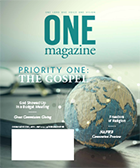
April-May 2019
Priority One:
The Gospel
------------------
|





INTERSECT
Stewardship: Under the Influence (1 Corinthians 5)
“Show me your friends and
I’ll show you your future.”
That’s a generally accepted truth. Sure, there are exceptions, but generally speaking, the company we keep impacts us. The people with whom you associate most are shaping you—consciously or not. The Lord is concerned with the company we keep. This is why Christian fellowship is so important. Fellowship isn’t just eating (or overeating) fried chicken together. Fellowship is sharing in Christ together—embracing common life in Christ. Our friendships, both in the church and beyond the church, deeply impact each one of us.
Maybe that is why Paul urged the church at Corinth to take a drastic action toward a professing brother in the church living in unrepentant sin. Paul instructed the Corinthian congregation to remove the man from the church fellowship, to purge the evil from among them. This individual bore the name of Christ, but his behavior betrayed the name. Yet, the believers at Corinth had continued to associate with him, “hanging out” together in spite of his openly sinful lifestyle. Paul made it clear something had to change. He warned the Corinthian believers not even to eat with this person. The goal or purpose for this action was redemptive, that his spirit ultimately might
be saved.
As Paul continued his letter, he offered an important, related truth in verse 10: Christians cannot withdraw completely from association with sinners; it is impossible. However, we should avoid two extremes: 1) complete cultural withdrawal or becoming so inward focused that we lose sight of our world-changing mission; and 2) cultural adaptation, where the church attempts to become like the world to win the world.
Neither approach is correct. Jesus prayed we would be in the world but not of the world. As Christ’s disciples, if we are salt and light for a dark and decaying world, clearly we must be immersed into that world. How else will people “taste the salt” or “see the light”? This was Paul’s point in verse 10. If you have no association with sinners of any kind—immoral, covetous, idolaters, revilers, drunkards, or swindlers—you are not in the world, because sinners inhabit the world.
We feel a tension here. We must be in the world, but we cannot be of the world. We cannot become like the world in our values, thinking, lifestyle, and beliefs. A Christian without caution may soon fall prey to the entanglements of the world. The influence of the world upon the follower of Christ is steady, subtle, and dangerous. Scripture commands us not to “love the world, neither the things which are in the world,” because “whoever loves the world doesn’t have the love of the Father in him.” In another passage, Paul shared the sad example of Demas, who “having loved this present world,” left Paul and the ministry.
It’s true we should never have a holier-than-thou attitude toward people in the world (or in the church, for that matter). Unbelievers pick up on this easily. However, we should never accept the attitude that holiness doesn’t matter. Holiness does matter. The Bible says without holiness no one will see the Lord. God is concerned with your personal holiness. It is not something you can accomplish on your own; it is accomplished by His grace as you yield yourself to the working of His Holy Spirit.
In response to Paul’s warning, I encourage two simple things:
Stay True to Your Real Identity. As a Christian, stay true to your real identity as a child of God, a pilgrim in this world. While I have neither a Facebook page nor a Twitter account I have observed that most social media users generally have a section right under their profile picture that declares who they are in simplest terms: Christian, husband, father, pastor, writer, and so on. I applaud the fact that Christian is first on the list. It is our primary identity, and it affects every other area of life.We all need people in our lives who help us stay true to our identity, keep us in check, and hold us accountable. They don’t condemn us when we fail, but remind us who God is and why we are here. That is what this individual at Corinth needed—some “tough love”—friends who loved him enough to call him out on the sin and hold him accountable, even if it meant church discipline. We need those people in our lives, and we need to be that kind of person in the lives
of others.
Influence Intentionally. As you remember your true identity, consider those within your circle of influence. You may need to cut ties altogether with some friends because you no longer share the same lifestyle, goals, and ambitions. Your relationship with them is harmful to your own walk with Christ. Other unsaved friends may respect your beliefs and values and embrace your friendship, including where you stand on matters of life and faith and eternity. This opens the door to a redemptive relationship. We must be deliberate, careful, and intentional in building relationships with unbelievers for the sake of the gospel—from home to work to community activities.
For years, Thom Rainer, president of LifeWay, has made it his practice to visit local barbershops for the purpose of evangelism. He builds a relationship with the barber for the sole purpose of sharing the gospel. He stays at the shop until he learns the barber is a Christian (or becomes a Christian) then moves to the next shop. Why? He knows time is limited, and he wants to be intentional with his influence.
Let’s relate to the unbelieving world but stay true to our iden
tity. Unbelievers don’t need us to try to be cool to reach them; they certainly don’t need us to live like the world. The best way to reach them is to let them see Christ in us. If you haven’t been living according to your real identity, I urge you to seek forgiveness, reestablish your identity in Him, and then determine to intentionally influence others for Him.
About the Writer: Dr. Barry Raper pastors Bethel FWB Church near Ashland City, Tennessee. He also serves as program coordinator for ministry studies at Welch College and is a member of the Tennessee Christian Education Board. Barry and his wife Amanda have five children: Hannah, Tre, Emma, Caroline, and Elijah.
|
|

